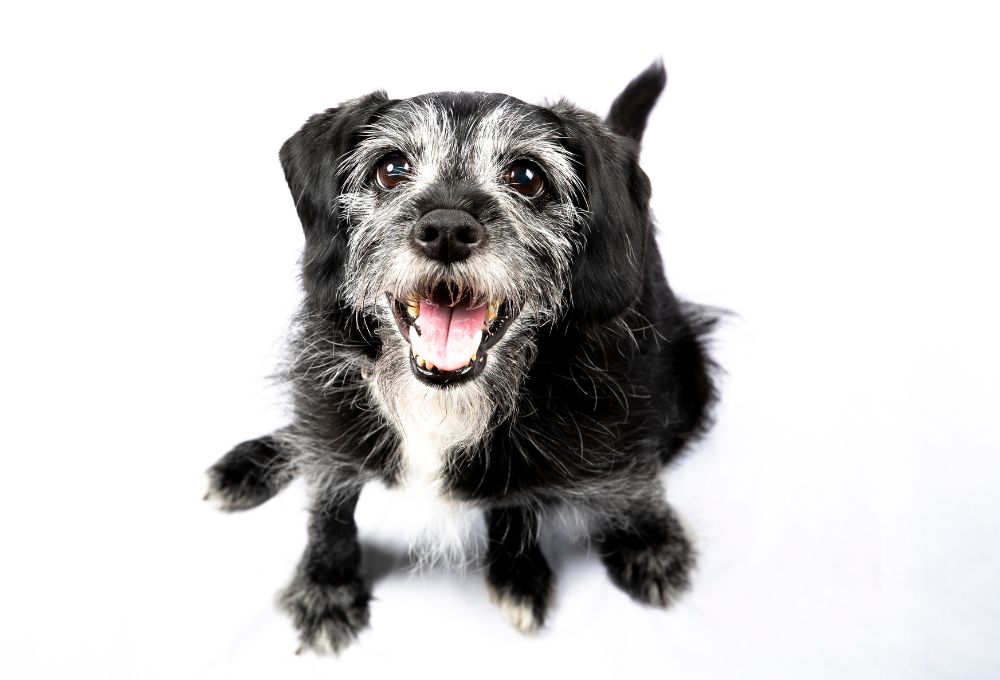
One common concern that pet owner experience as their beloved companion ages is the development of a hunched back. It is very hard to see our pets lose mobility but by providing appropriate care, we can help them maintain their comfort and overall well-being.
Let’s see what are the common causes, symptoms, diagnosis, and treatment options for senior dogs with hunched back.
3 Common Causes of a Hunched Back in Senior Dogs
Arthritis
Dog arthritis is a degenerative disease that causes inflammation and deterioration of the joints. Your pup may be hunching its back to alleviate the pain and stiffness in its joints.
Spondylosis
Spondylosis is a generative disease that affects the vertebral bones of the spine. New bone grows at the edges of the vertebral bones along the spine, resulting in restricted mobility and deformation.
Muscle weakness
Muscle weakness or atrophy is another factor that can lead to a hunched-back in senior dogs. Dogs, as they age, experience a gradual loss of muscle mass, especially if they lead a sedentary lifestyle. Weakened muscles fail to support the spine adequately, resulting in a stooped posture.
Recognizing the Symptoms
Besides the obvious visual sign of a rounded or arched spine, senior dogs may show signs of pain, stiffness, and difficulty in movement. They may not want to engage in physical activities that they used to enjoy and may need help with climbing the stairs, hopping on the couch, or lying down on the floor.
Diagnosis and Veterinary Consultation
If you notice your senior dog developing a hunched back, it is important to seek veterinary consultation for a proper diagnosis. A veterinarian will perform a thorough physical examination, evaluating your dog’s posture, range of motion, and any associated discomfort. Also, diagnostic imaging, such as X-rays or MRI scans, will help to identify any underlying issues.
Treatment Options for Senior Dogs
The treatment varies depending on the underlying cause and the severity of the condition. Here are some of the common treatment options:
- Pain management strategies, such as Non-steroidal anti-inflammatory drugs (NSAIDs) can be used to alleviate discomfort.
- Physical therapy, including gentle exercises and stretches, can help maintain muscle tone and improve mobility.
- Surgical interventions may be necessary for some conditions, for example, if a herniated disc is causing the hunched back.
Other alternatives therapies include:
- Acupuncture can promote circulation, reduce inflammation, and provide relaxation. Certified veterinary acupuncturists can provide this treatment safely and effectively.
- Chiropractic can improve spinal alignment and mobility, alleviate pain, reduce inflammation, and enhance overall body function. It is important to seek a qualified and experienced animal chiropractor for this treatment.
- Laser therapy can help pain management and reduce inflammation.
- Herb remedies can help with inflammation and pain management too. Turmeric, ginger, and Boswellia are commonly used herbs known for their anti-inflammatory effects.
- Natural supplements that contain glucosamine and chondroitin sulfate are commonly used to promote cartilage health and reduce joint inflammation. Omega-3 fatty acids, such as fish oil, can help reduce inflammation and support overall joint health.
Lifestyle Modifications for Improved Comfort
- Provide a comfortable sleeping area. Some options available are orthopedic beds, memory foam mattresses, and heating mats.
- Provide gentle walks and exercise to maintain the mobility of the joints and muscle strength. For example, 10 min walks in a familiar environment or controlled play sessions can be enough.
- Use carpets or mats at home to provide a non-slippery surface.
- Raise the food and water bowl to avoid overload of the front legs.
Supportive Measures and Assistive Devices
In addition to lifestyle modifications, various supportive measures and assistive devices can improve mobility and reduce the risk of injury.
- Orthopedic harnesses or slings can provide additional support during walks or when assisting the dog in standing up.
- Ramps or steps can be used to help the dog access elevated surfaces, such as beds or cars, without straining their joints.
- Strollers can give you the flexibility to go further without compromising your pup’s joints.
Preventive Care and Maintenance
In addition to regular checks with the vet, there is other preventative care to minimize the risk of a hunched-back in senior dogs.
- Joint supplements, which contain ingredients like glucosamine and chondroitin, can support joint health and potentially slow down the progression of arthritis.
- Maintaining a healthy weight through a balanced diet is crucial to minimize stress on the joints. Consult your veterinarian for recommendations regarding suitable senior dog diets that cater to their specific nutritional needs.
- Provide mental stimulation and engage in activities that promote cognitive function, as a happy and mentally stimulated dog tends to have better overall well-being.
Related Questions
While complete reversal may not be possible in all cases, appropriate treatment and management strategies can help alleviate discomfort, improve mobility, and slow down the progression of the condition.
Consider short and gentle walks on soft surfaces. Use assistive devices if necessary such as a harness or a sling. Monitor any signs of discomfort or pain like reluctance to continue walking, fatigue, etc.
Final Thoughts
Ultimately, unconditional love and support from their hooman family members are vital for senior dogs. Be patient and accommodate to prioritize their comfort and happiness. Cherish the special moments you have with your senior dog, and ensure they receive the care and attention they deserve.
Recent Posts:
- Is the Dogo App Worth It? Honest Review After Training My Dog
- Amazon’s Top Black Friday and Cyber Monday Deals for 2024: Dog Products Edition
- Top Pet Trackers for Sending Your Dog with a Pet Sitter
- Should Dogs Wear Bells?
- Which Dog Breed Has the Longest Lifespan?
Recent Posts
Is the Dogo App Worth It? Honest Review After Training My Dog
Training your dog shouldn’t feel like another chore, but it often does because, unless you’re a professional trainer, you have to research everything yourself first. And that research can take...
Amazon's Top Black Friday and Cyber Monday Deals for 2024: Dog Products Edition
The holiday shopping season has officially started and Amazon has already released some incredible deals on pet products for Black Friday and Cyber Monday 2024. Here is our curated list of the...
